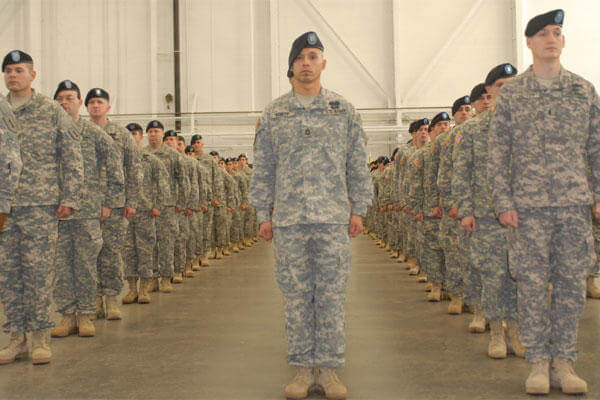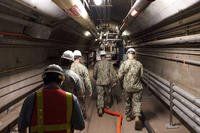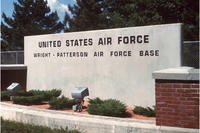About 500 troops from the U.S. Army's 1st Infantry Division in Fort Riley, Kansas, will head to Iraq and other countries in the Middle East next month to help coordinate the campaign against the Islamic State, the Pentagon said Thursday.
More than 200 of the soldiers will be based in Iraq at U.S. Joint Operations Centers (JOCs) in Baghdad and the Kurdish capital of Irbil, and the rest of the contingent will operate out of U.S. bases in the region under the U.S. Central Command, Rear Adm. John Kirby, the Pentagon press secretary, said at a Pentagon briefing.
The initial plan was to have 138 of the troops at the operations center in Baghdad, 68 at the operations center in Irbil and 10 at the Iraqi Defense Ministry, Kirby said. The 200-plus troops will be part of the 475-troop contingent President Barack Obama authorized last month to serve in Iraq as advisers to the Iraqi National Security forces and the Kurdish Peshmerga forces.
However, the 200 from the 1st ID will not "embed" with the other advisers at the brigade and headquarters levels with the Iraqi and Kurdish forces, Kirby said. Instead, the 1st ID troops will perform duties at the JOCs, he said.
Last week, Gen. Ray Odierno, the Army Chief of Staff, said he had signed off on "sending another division headquarters to Iraq to control what we're doing there, a small headquarters." The division headquarters would be the first to deploy to Iraq since the 2011 withdrawal of U.S. forces from the country.
Kirby said that the "Big Red One" troops "will have command and control of ongoing advise and assist efforts in support of Iraqi and Peshmerga forces, and continue to help us all degrade and destroy" the Islamic State terror group, which has taken over swaths of Iraq and Syria.
The U.S.-led airstrikes, which began in Iraq on Aug. 8 and were extended into Syria on Monday night, had the primary purpose of degrading IS forces to allow the struggling Iraqi National Security forces and Peshmerga troops to regroup and retake territory from the militants under cover of U.S. and coalition air power. The overall plan was in effect an "Iraq first" campaign, Army Lt. Gen. William C. Mayville, Jr., said at a Pentagon briefing Tuesday.
"The Iraqi security forces are beginning to hold their own," Kirby said, but "their performance as an army is still mixed."
Kirby described different goals for the current airstrikes in Syria and Iraq. The strikes in Syria were strategic, and meant to degrade the overall effectiveness of IS, he said. In Iraq, the airstrikes were tactical and meant to allow the Iraqi and Kurdish forces to maneuver, he said.
"This is going to take time," Kirby said. "This is not a short-term effort. How do you know you're winning? It's going to take us a while to be able to say that."
Kirby pointed to the strategic intent of the airstrikes in eastern Syria on Thursday against small oil refineries run by IS to "remove the means through which this organization sustains itself."
Coalition aircraft from Saudi Arabia and the United Arab Emirates flew the majority of mission against the oil assets that hit 12 targets, he said.
A total of 16 aircraft were involved and 10 were from Saudi Arabia and the UAE, Kirby said. A total of 41 precision bombs were dropped and 23 of those came from the Saudi and Emirates aircraft, he said.
The retiring chairman of the Senate Armed Services Committee this week praised the Arab countries for joining the U.S. in launching airstrikes in Syria against Islamic militants. "Without that support, this effort … would be significantly weakened and its mission significantly in jeopardy," Sen. Carl Levin, 80, the longtime Democrat from Michigan who plans to retire when his term ends in January said during a briefing with defense reporters in Washington, D.C.
While Levin acknowledged that during the opening wave of the attack, the U.S. dropped the vast majority of the bombs, missiles and rockets fired from Navy ships and aircraft flying from host bases in the region, he also played down the importance of how much ordnance came from the Arab states. "The significant thing is that they're flying and they're dropping bombs," he said. "You've got Arab countries up there flying F-16s and F-15s and F-18s and dropping ordnance."
Kirby said he could not confirm reports from the region of civilian casualties from the wide-ranging airstrikes in Syria on Monday. The Pentagon initially said there were no indications of civilian casualties but Kirby said "we don't have any credible operational reporting" from the areas hit to confirm or dispute accounts of civilian casualties.
"We don't have anybody on the ground," Kirby said, but "we're looking into it."
-- Richard Sisk can be reached at richard.sisk@monster.com





























